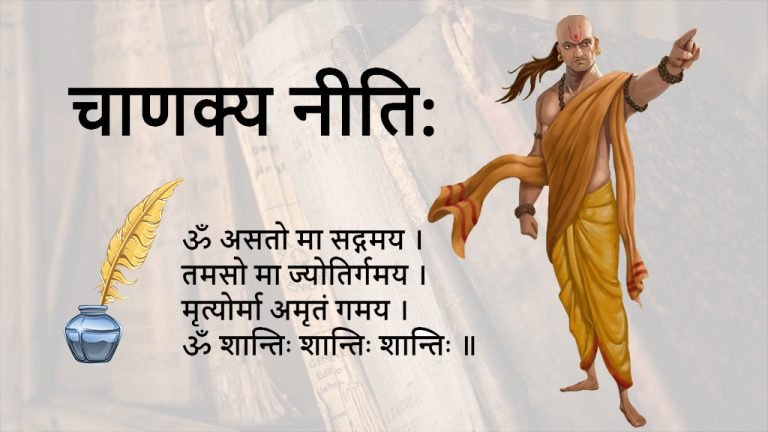Chanakya is considered the pioneer of the field of Political science and economics in India, and his work is thought of as an important precursor to classical economics. Chanakya the Great Economist was an ancient Indian polymath who was active as a teacher, author, strategist, philosopher, economist, jurist and royal advisor. He is traditionally identified as Kauṭilya or Vishnugupta, who authored the ancient Indian political treatise, the Arthashastra, a text dated to roughly between the fourth century BCE and the third century CE. The Arthashastra continued to exert considerable influence after the reign of Ashoka but then disappeared and was considered lost until it was discovered in 1905 CE by the Sanskrit scholar Rudrapatna Shamasastry (l. 1868-1944 CE). Rudrapatna Shamasastry published the work in 1909 CE and then translated it into English and published that version in 1915 CE which brought it greater attention.
Chanakya’s Arthashastra which is very famous by the name of Niti Shastra, describes 17 chapters and 342 sutras written in it. For details visit our site https://digitalksp.com/category/education/.
Chanakya NITI – 7th Chapter – in English
- A wise man should not reveal his loss of wealth, the vexation of his mind, the misconduct of his own wife, base words spoken by others,and disgrace that has befallen him.
- He who gives up shyness in monetary dealings, in acquiring knowledge, in eating and in business, becomes happy.
- The happiness and peace attained by those satisfied by the nectar of spiritual tranquillity is not attained by greedy persons restlessly moving here and there.
- One should feel satisfied with the following three things; his own wife, food given by Providence and wealth acquired by honest effort; but one should never feel satisfied with the following three; study, chanting the holy names of the Lord (japa) and charity.
- Do not pass between two brahmanas, between a brahmana and his sacrificial fire, between a wife and her husband, a master and his servant, and a plough and an ox.
- Do not let your foot touch fire, the spiritual master or a brahmana; it must never touch a cow, a virgin, an old person or a child.
- Keep one thousand cubits away from an elephant, a hundred from a horse, ten from a horned beast, but keep away from the wicked by leaving the country.
- An elephant is controlled by a goad (ankusha), a horse by a slap of the hand, a horned animal with the show of a stick, and a wicked person with a sword.
- One can control an elephant by a goad, a horse by a whip, animals with horns by a stick but a wicked person should be dealt with a sword only because wicked person is the most dangerous than all these.
- Brahmanas find satisfaction in a good meal, peacocks in the peal of thunder, a sadhu in seeing the prosperity of others, and the wicked in the misery of others.
- Conciliate a strong man by submission, a wicked man by opposition, and the one whose power is equal to yours by politeness or force.
- The power of a king lies in his mighty arms; that of a brahmana in his spiritual knowledge; and that of a woman in her beauty, youth and sweet words.’
- Do not be very upright in your dealings and behaviour for you would see by going to the forest that straight trees are cut down while crooked ones are left standing.
- The swans reside in a pond only when it is full of water but desert it when it is dried up but come back again when it is again full of water. A man should not be so selfish but should live with his benefactor through thick and thin.
- Accumulated wealth is saved by spending just as incoming fresh water is saved by letting out stagnant water.
- He who has wealth has friends and relations; he alone survives and is respected as a man.
- The following four characteristics of the denizens of heaven may be seen in the residents of this earth planet; helping others, charity, sweet words, worship of the Supreme Personality of Godhead, and satisfying the needs of brahmanas.
- The following qualities of the denizens of hell may characterize men on earth; extreme wrath, harsh speech, enmity with one’s relations, the company with the base, and service to men of low extraction.
- By going to the den of a lion pearls from the head of an elephant may be obtained; but by visiting the hole of a jackal nothing but the tail of a calf or a bit of the hide of an ass may be found.
- The life of an uneducated man is as useless as the tail of a dog which neither covers its rear end, nor protects it from the bites of insects.
- Purity of speech, of the mind, of the senses, and of a compassionate heart are needed by one who desires to rise to the divine platform.
- As you seek fragrance in a flower, oil in the sesamum seed, fire in wood, ghee in milk, and jaggery (guda) in sugarcane; so seek the spirit that is in the body by means of discrimination.






